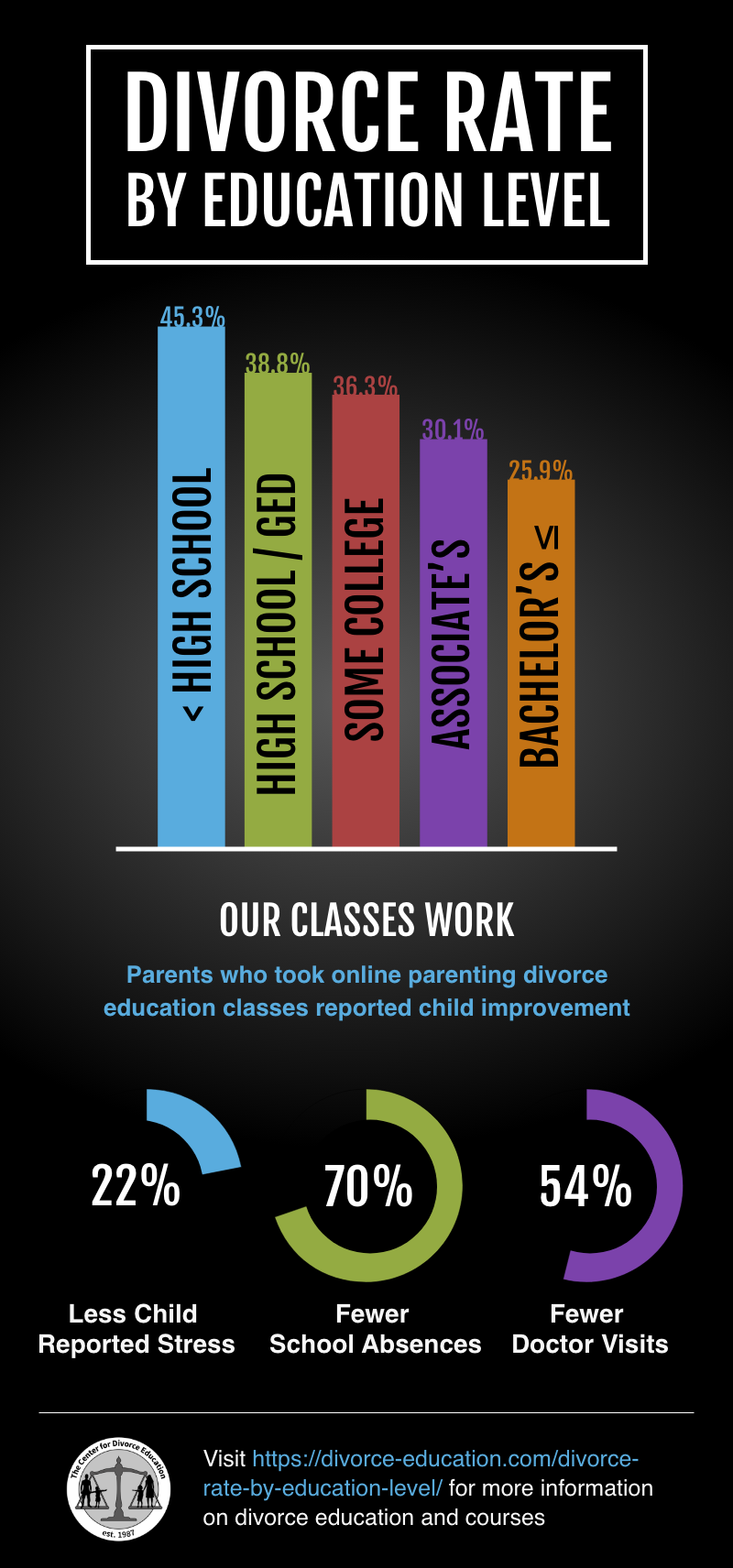
Did you know that there may be a correlation between divorce and education level? Studies have found that marriages of college-educated couples seem to last longer than they did 30 years ago — and nearly 78 percent of college-educated women who were married for the first time between 2006 and 2010 can expect their marriages to last at least two decades.
In this article, we will go over some studies and statistics related to divorce rate by education level.
Studies Show a Link Between Higher Education and Divorce Rates
Recent studies have shown that there is a significant correlation between higher education and divorce rates. Let's start with a question: Divorce is least common among people with which of the following levels of education?
- Bachelor's degree or higher
- Some college
- High school diploma or less
If you said, "Bachelor's degree or higher," you're right. Research conducted by the National Center for Family & Marriage Research at Bowling Green State University discovered that individuals with higher levels of education tend to have lower divorce rates compared to those with lower levels of education. Data from the U.S. Census Bureau backs up those findings with similar numbers. Let's take a closer look at the data on divorce rate by education level.
Bachelor's Degree or Higher
According to the U.S. Census Bureau, in 2019, the divorce rate for individuals with a bachelor's degree or higher was 25.9%. This suggests that individuals with higher education levels, such as a bachelor's degree or beyond, tend to have lower divorce rates compared to individuals with lower levels of education.
Some College or Associate's Degree
Individuals with some college education or an associate's degree also tend to have lower divorce rates compared to those with lower education levels. The Census Bureau reported the divorce rate for individuals with some college education as 36.3%, while the divorce rate for those with an associate's degree was 30.1% This further supports the correlation between higher education levels and lower divorce rates.
High School Diploma or Less
In contrast, individuals with lower levels of education, such as a high school diploma or less, tend to have higher divorce rates. The divorce rate for individuals with a high school diploma was 38.8%, while the divorce rate for those with less than a high school diploma was 45.3%.
The data consistently suggests that higher education levels are associated with lower divorce rates, and vice versa. This correlation underscores the importance of education in promoting marital stability and resilience.

Factors Influencing the Relationship Between Divorce and Education
Why do people with less education have a higher likelihood of divorce? Several factors may contribute to the relationship between divorce and education:
- Economic Stability. Higher education levels are often associated with better job opportunities and higher income levels, which can contribute to financial security in a marriage. Economic instability and financial strain have been identified as risk factors for divorce, as they can lead to increased stress, conflict and strain on a relationship.
- Access to Support. Individuals with higher education levels may have greater access to resources and support networks that can help them navigate marital challenges and resolve conflicts, which can contribute to lower divorce rates.
- Cognitive Skills. Another factor that may influence the education-divorce relationship is the impact of education on individuals' communication skills, decision-making abilities and conflict-resolution strategies. Higher education levels are associated with better cognitive and social skills, which can enhance individuals' ability to communicate effectively, make informed decisions and resolve conflicts in a constructive manner. These skills are essential in maintaining healthy and resilient relationships, including marital relationships, and may contribute to lower divorce rates among individuals with higher education levels.
It's important to note that the relationship between education levels and divorce rates is complex.
While these trends may be present, you cannot simply determine someone's divorce rate by their education level. Many other factors, such as age, income, cultural norms and personal beliefs about marriage and divorce, also play a role.

*Included in SAMHSA's National Registry of Evidence-Based Programs and Practices
© 2024 The Center for Divorce Education